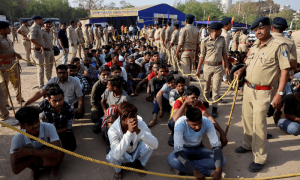The HRW report on India’s deportation of Bengali Muslims has raised major concerns globally about legal process, minority rights, and humanitarian protections. The report, issued by Human Rights Watch (HRW), highlights instances where Bengali-speaking Muslims were deported from India to Bangladesh without following due legal procedures.
The issue has drawn attention from human rights advocates, legal scholars, and regional observers, sparking calls for greater transparency and adherence to due process in immigration enforcement.

Table of Contents
ToggleWidespread Concerns from the HRW Report on India’s Deportation of Bengali Muslims
The HRW report on India’s deportation of Bengali Muslims notes that over 1,500 individuals—including women and children—were deported between May 7 and June 15, 2025. It cites testimonies and data shared by officials in Bangladesh, raising questions about the legal standards used for their removal.
The report comes amid broader immigration control measures by the government and connects with past patterns observed in border regions such as Assam and West Bengal—home to many Bengali-speaking Muslim communities.
Elaine Pearson, Asia Director at HRW, said:
“These individuals were deported without clear legal proceedings in place. That undermines due process and human rights protections.”
HRW warns that such actions, if not properly reviewed, can set a concerning precedent in the region.
Personal Experiences from the HRW Report
Among the findings in the HRW report on India’s deportation of Bengali Muslims are interviews with 18 affected people. One 51-year-old daily wage worker from Assam described being taken to the border at gunpoint, with little to no explanation of the procedure.
“I walked into Bangladesh like a dead body,” he told HRW, highlighting the fear, confusion, and lack of communication involved.
These personal testimonies are key human elements in the HRW report on India’s deportation of Bengali Muslims, and they underscore the need for administrative safeguards and proper notice before deportation.
For more context, you can read our earlier analysis on India’s citizenship verification policies.
Political and Diplomatic Impact
The HRW report on India’s deportation of Bengali Muslims comes at a time of changing geopolitical dynamics. A 2024 political shift in Bangladesh has added complexity to cross-border cooperation. Additionally, following a security incident in Kashmir, India stepped up national operations that included detentions and documentation checks.
While the Indian government has described the actions as adherence to immigration controls, the HRW report on India’s deportation of Bengali Muslims questions whether those deported had the opportunity to verify their citizenship or seek legal aid.
Other international watchdogs, such as Amnesty International, have echoed these concerns.
Call for Legal and Transparent Procedures
The HRW report on India’s deportation of Bengali Muslims urges fair treatment and legal review mechanisms to be offered to all individuals subjected to deportation. HRW also highlights the importance of India’s historic reputation as a sanctuary for displaced peoples, encouraging a return to humanitarian principles.
Pearson noted:
“India has a legacy of sheltering the vulnerable. Safeguards must be in place to avoid wrongful deportations and preserve fundamental rights.”
You can explore a related guide on how international law protects immigrants and refugees.
Global and Historical Perspective
According to the HRW report on India’s deportation of Bengali Muslims, this issue is part of a broader global pattern involving increasing enforcement measures against undocumented individuals. HRW draws parallels to recent reports on the repatriation of Rohingya refugees to Myanmar—some of whom have also faced uncertain fates.
The report emphasizes India’s role in setting international standards and encourages reforms in immigration policies that respect legal frameworks and humanitarian values.


